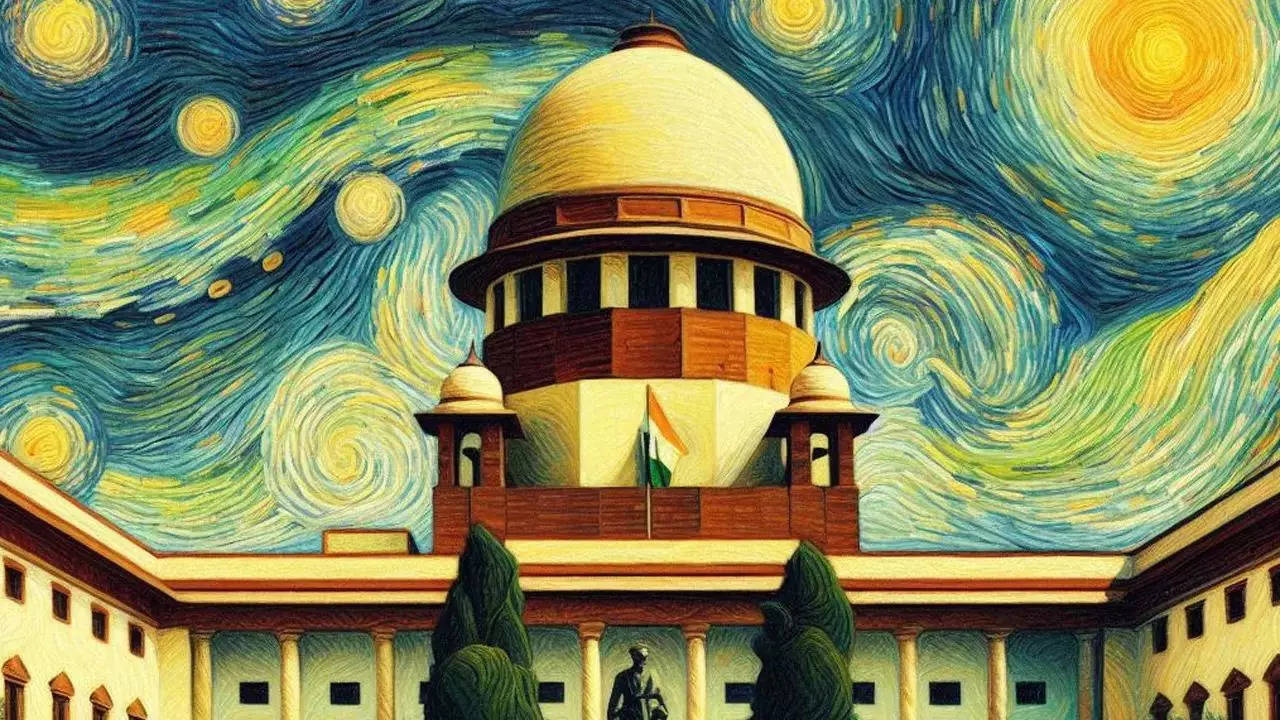NEW DELHI: Supreme Court on Tuesday agreed to examine the validity of a provision of the SC & ST (Prevention of Atrocities) Act, 1989 that mandates imposition of capital punishment on a person if false and fabricated evidence given by him leads to conviction, imposition of death penalty and execution of a SC/ST community member.
A bench of Justices Surya Kant and K V Viswanathan was hearing a challenge to the rarely used provision on the ground that it is not consistent with the “rarest-of-rare” benchmak set by SC for awarding capital punishment.
A five-judge SC bench in the Bachan Singh case on May 9, 1980, had ruled that death penalty could be imposed by courts on persons convicted only in ‘rarest of rare’ murder cases involving extreme brutality. The SC had said, “… for persons convicted of murder, life imprisonment is the rule and death sentence an exception… concern for the dignity of human life postulates resistance to taking a life through law’s instrumentality. That ought not to be done save in rarest of rare cases when the alternative option is unquestionably foreclosed.”
PIL petitioner and advocate Rishi Malhotra pointed out to a bench of Justices Kant and Viswanathan that Section 3(2)(i) of SC/ST Act provided that if an innocent member of a SC or ST community was “convicted and executed in consequence of such false or fabricated evidence, the person who gives or fabricates such false evidence, shall be punished with death”.
He informed the court that Section 303 of the Indian Penal Code, which imposed mandatory death sentence on a person who committed a murder while serving life sentence for another murder, was struck down as unconstitutional by another five-judge bench in Mithu vs Punjab case in 1983 by applying the Bachan Singh judgment ratio.
Justice Kant said SC/ST Act is not one of those archaic colonial laws but one enacted by Parliament in 1989. “The provision may have been consciously enacted to send a strong message not to implicate people belonging to poor and marginalised sections of the society in criminal cases,” Justice Vishwanath said the norm is life sentence and capital punishment is an exception. Malhotra argued that Bachan Singh case ‘rarest of rare’ jurisprudence was further developed over the decades by the SC to make imposition of death penalty a rarity by vesting discretion with the judiciary to decide the quantum of punishment for a gruesome murder by examining several aspects relating to the crime, accused, circumstances, and most importantly amenability to reform.
Attorney general R Venkataramani told the court that since the IPC, CrPC and Evidence Act has undergone reforms, he would consult the govt about introduction of reforms in other penal laws. The bench said that would be better and posted the matter for hearing in July.
The court repeatedly asked whether there are instances of persons suffering the death penalty under Section 3(2)(i) of the SC/ST Act. Both the AG and Malhotra said they have not come across a single case.
A bench of Justices Surya Kant and K V Viswanathan was hearing a challenge to the rarely used provision on the ground that it is not consistent with the “rarest-of-rare” benchmak set by SC for awarding capital punishment.
A five-judge SC bench in the Bachan Singh case on May 9, 1980, had ruled that death penalty could be imposed by courts on persons convicted only in ‘rarest of rare’ murder cases involving extreme brutality. The SC had said, “… for persons convicted of murder, life imprisonment is the rule and death sentence an exception… concern for the dignity of human life postulates resistance to taking a life through law’s instrumentality. That ought not to be done save in rarest of rare cases when the alternative option is unquestionably foreclosed.”
PIL petitioner and advocate Rishi Malhotra pointed out to a bench of Justices Kant and Viswanathan that Section 3(2)(i) of SC/ST Act provided that if an innocent member of a SC or ST community was “convicted and executed in consequence of such false or fabricated evidence, the person who gives or fabricates such false evidence, shall be punished with death”.
He informed the court that Section 303 of the Indian Penal Code, which imposed mandatory death sentence on a person who committed a murder while serving life sentence for another murder, was struck down as unconstitutional by another five-judge bench in Mithu vs Punjab case in 1983 by applying the Bachan Singh judgment ratio.
Justice Kant said SC/ST Act is not one of those archaic colonial laws but one enacted by Parliament in 1989. “The provision may have been consciously enacted to send a strong message not to implicate people belonging to poor and marginalised sections of the society in criminal cases,” Justice Vishwanath said the norm is life sentence and capital punishment is an exception. Malhotra argued that Bachan Singh case ‘rarest of rare’ jurisprudence was further developed over the decades by the SC to make imposition of death penalty a rarity by vesting discretion with the judiciary to decide the quantum of punishment for a gruesome murder by examining several aspects relating to the crime, accused, circumstances, and most importantly amenability to reform.
Attorney general R Venkataramani told the court that since the IPC, CrPC and Evidence Act has undergone reforms, he would consult the govt about introduction of reforms in other penal laws. The bench said that would be better and posted the matter for hearing in July.
The court repeatedly asked whether there are instances of persons suffering the death penalty under Section 3(2)(i) of the SC/ST Act. Both the AG and Malhotra said they have not come across a single case.
